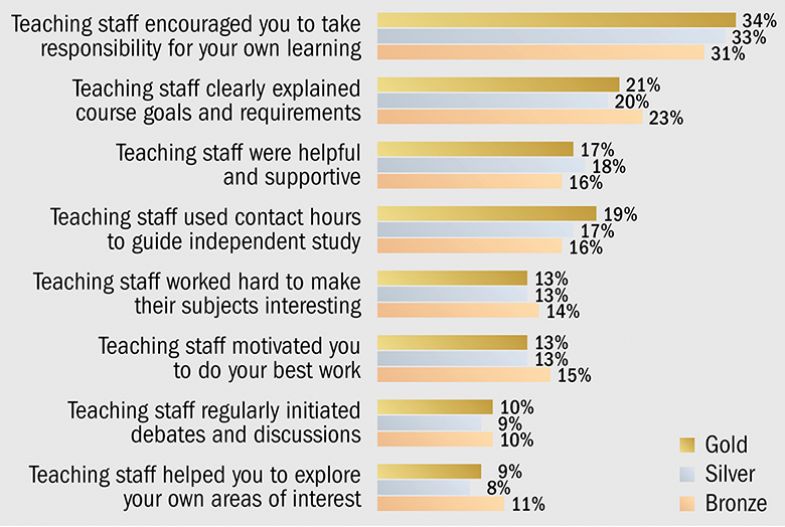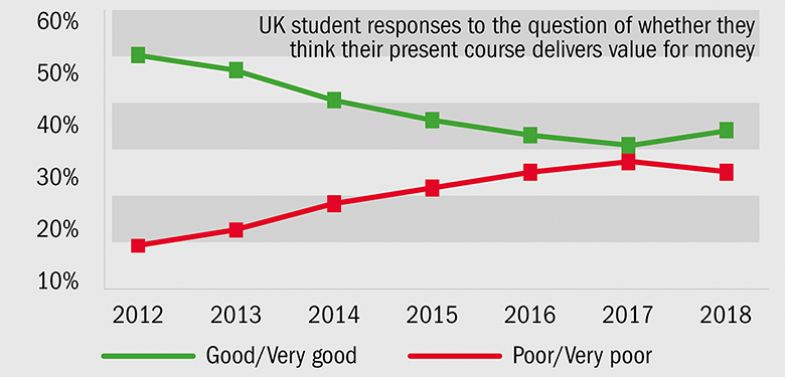Undergraduates at UK universities that were rated gold in the teaching excellence framework are more likely to feel that they are getting good value for money but do not necessarily feel that they are being taught any better than students at silver or bronze institutions, according to a major survey.
The results of the annual Student Academic Experience Survey conducted by the Higher Education Policy Institute and Advance HE – released on 7 June after the latest round of TEF results was published – raise the question of whether students at gold universities perceive that they are getting better value for money because they feel that they are being taught well, or because they have been told that they are.
The survey, completed by 14,046 full-time undergraduates, found that 40 per cent of respondents from institutions that were gold-rated last year felt that they were getting “good” or “very good” value for money, compared with 33 per cent and 34 per cent at silver and bronze providers, respectively.
Value for money by TEF award
However, when students were asked about eight specific aspects of teaching quality, there was no clear link between gold ratings and high scores. In fact, bronze institutions scored highest in four areas, when students were asked whether teaching staff clearly explained course goals and requirements, worked hard to make subjects interesting, motivated students to do their best work, and helped learners to explore their own areas of interest.
Gold institutions, in contrast, fared better in only two areas: encouraging students to take responsibility for their own learning, and using contact hours to guide independent study.
Teaching staff characteristics by TEF award
Jonathan Neves, associate head of insights at Advance HE, said that the results demonstrated how perceptions of value for money “go beyond teaching quality” and could instead reflect factors such as job prospects or the quality of the campus environment.
“People may be surprised…that we found no link between students’ perceptions of teaching quality and the institutional TEF rating,” Mr Neves said. “It is interesting because we put these very specific questions around teaching quality to students in a way that [the] TEF, which is very wide-ranging, does not.
“It is interesting to see that there is evidence of good teaching if you ask students at bronze institutions as well.”
Students’ overall views of teaching quality were slightly worse in each of the eight areas bar one this year compared with 2017.
Perceptions of value for money
The good news for universities, however, was the reversal of a five-year downward trend in overall perceptions of value for money. Thirty-eight per cent of students across the UK felt that they got good or very good value for money, up three percentage points year-on-year, while 32 per cent felt that they got poor or very poor value, down from 34 per cent. Looking at England only, 35 per cent of respondents said that they felt they were getting good or very good value for money, an improvement on last year’s result.
The survey found that students identified teaching quality as the biggest factor in contributing to their views on value for money, followed by course content and facilities. This was reflected in the areas that students named as the main areas in which they felt tuition fees should be spent: teaching, support services, and campus improvements.
However, there were significant differences in students’ perceptions of value for money by subject: medicine and dentistry students were twice as likely to report good value for money as their peers on business and administrative studies courses (62 per cent versus 28 per cent).
Students in subjects that typically have a high workload, such as medicine and dentistry, were least likely to say that they would have chosen another course in hindsight, with fewer than one in 10 respondents giving this answer. In contrast, about one in five respondents from courses with typically lower workloads including business and languages – as well as physical sciences, which usually has a high workload – said that they would choose a different subject if they could.
This year, UK-domiciled respondents were also asked about their perceptions of studying with international students, as the UK reviews its migration policy on the issue. The survey found that home students did see some benefits, with 62 per cent agreeing that learning alongside foreigners gave them a better worldview, but on the whole they were much more neutral, and a significant minority perceived negative consequences: 16 per cent said that learning alongside overseas students resulted in academic discussions of a lower quality, and 22 per cent felt that it slowed down the class.
Nick Hillman, Hepi’s director, said that the survey revealed the “flaws” in the UK’s higher education sector, as well as its success stories.
“I am struck by the upturn in perceptions of value for money this year: it had been declining year-on-year but now is on the up, which is good news for universities,” Mr Hillman said. “One of the criticisms levelled at the survey in previous years was that we don’t know what students are thinking about when they consider value for money, so this year we asked them. It’s very interesting that some of those factors are really outside the university’s control, such as living costs, but some, such as teaching quality, are absolutely within the university’s remit.”
POSTSCRIPT:
Print headline: Good value, not good teaching, recognised at ‘gold’ providers
Register to continue
Why register?
- Registration is free and only takes a moment
- Once registered, you can read 3 articles a month
- Sign up for our newsletter
Subscribe
Or subscribe for unlimited access to:
- Unlimited access to news, views, insights & reviews
- Digital editions
- Digital access to THE’s university and college rankings analysis
Already registered or a current subscriber? Login











